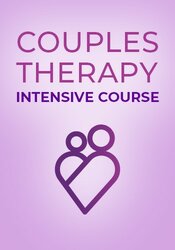The Three Stages of Infidelity Treatment

Infidelity can shake the foundation of a relationship, leaving partners feeling betrayed, confused, and uncertain about their future together. As a couples therapist, you can often feel challenging working with couples in the aftermath of infidelity and navigating this crisis requires a structured approach to healing. The Developmental Model of Couples Therapy outlines three critical stages of infidelity treatment: the Initial Stage, the Middle Stage, and the Termination Stage. Each phase can help you address the distinct emotional and relational challenges that your couples face in their journey toward healing and resolution.
Infidelity recovery is not a linear journey, and each couple will navigate these stages at their own pace. Your expertise as a therapist can make the difference between a couple remaining stuck in pain and finding a path toward healing and growth. By methodically addressing the challenges of each stage, you provide a framework that fosters deep introspection, honest communication, and, ultimately, transformation—whether the couple decides to rebuild their relationship or move on separately.
Stage 1: The Initial Stage – Stabilization and Crisis Management
The discovery of infidelity is often accompanied by intense emotional upheaval. In this first phase, your role is to slow down the process and provide a structured space where both partners can begin to process what has happened. Key objectives include:- Avoiding impulsive decisions: Partners may be tempted to make immediate, drastic choices about the future of their relationship. Encourage them to pause and reflect rather than act out of emotional distress.
- Clarifying immediate threats: Address critical concerns such as whether the affair has stopped, whether the couple will continue living together, and how they will manage their daily lives in the short term.
- Managing emotional escalations: Avoiding the blame cycle is crucial. Therapy should provide a controlled environment where emotions are acknowledged but not allowed to spiral out of control.
- Defining individual contributions: Helping each partner recognize their own role in the dynamics that preceded the affair, without excusing the betrayal, sets the groundwork for deeper exploration later.
Stage 2: The Middle Stage – Self-Exploration and Differentiation
As the couple moves beyond the immediate crisis, they enter a stage where deeper individual and relational work takes place. The focus shifts to personal growth, emotional processing, and relationship repair. Key areas of focus include:- Encouraging self-differentiation: Each partner must explore their own emotional wounds, unmet needs, and patterns that contributed to relationship struggles. This process strengthens their ability to engage in an authentic and honest relationship moving forward.
- Processing anger and betrayal: Both partners need space to work through their emotions in a way that fosters healing rather than perpetuating conflict.
- Addressing ongoing triggers: Infidelity often leaves emotional triggers that surface unexpectedly. Teaching couples how to navigate anniversaries, reminders, and intrusive thoughts is essential.
- Building honesty and trust: The betraying partner must demonstrate increased transparency and accountability, while the betrayed partner learns to manage intrusive thoughts without getting stuck in an endless cycle of painful questioning.
Stage 3: The Termination Stage – Decision Making and Future Planning
By the final stage, couples must decide whether they will continue their relationship or separate. Your role is to facilitate this decision-making process by helping partners reflect on their journey and their capacity for future growth. Key goals include:- Clarifying agreements: If the couple chooses to stay together, they must establish a renewed understanding of monogamy and honesty in their relationship.
- Defining personal growth: Each partner should have a clearer understanding of their individual development and how they contribute to a healthier partnership.
- Determining therapy continuity: Some couples may require continued therapy to maintain progress, while others may feel ready to move forward independently.
- Avoiding reliance on behavior change alone: True healing goes beyond apologies and behavioral adjustments. It requires fundamental shifts in emotional engagement and communication.
Infidelity recovery is not a linear journey, and each couple will navigate these stages at their own pace. Your expertise as a therapist can make the difference between a couple remaining stuck in pain and finding a path toward healing and growth. By methodically addressing the challenges of each stage, you provide a framework that fosters deep introspection, honest communication, and, ultimately, transformation—whether the couple decides to rebuild their relationship or move on separately.
Free Event: Getting Started with Couples Therapy Intensives

Now, you have the opportunity to join Couples Intensive pioneers Ellyn Bader and Lori Weisman in this exclusive FREE workshop. You’ll be able to see the presenters at work with a real couple during a 2-day intensive. Get front-row access to watch and learn about critical decisions made during the process and hear them break-down the specific steps they take to help a long-term conflict-avoidant couple with a history of alcoholism.
You will walk away with the foundational insight and skills you need to start offering couples intensives in your therapy practice. Plus, you’ll receive bonus handouts and videos to use when working with your clients.
You will walk away with the foundational insight and skills you need to start offering couples intensives in your therapy practice. Plus, you’ll receive bonus handouts and videos to use when working with your clients.
Couples Therapy Intensive Course

Unlock the secrets of modern love with insights from top clinical innovators. This online course equips therapists with practical advice, real-life case studies, and demos to tackle pressing relationship issues. Elevate your practice and redefine client relationships.
Meet the Expert:
Ellyn Bader, PhD, is in private practice and is Co-Director of The Couples Institute in Menlo Park, California. Over the past 25 years she has conducted professional training programs in couples therapy and has trained therapists throughout the United States as well as Europe, Asia, South America, and Australia. She is a past president of the International Transactional Analysis Association and a recipient of the Clark Vincent Award for an outstanding literary contribution to the field of marital therapy from the California Association of Marriage and Family Therapists. Dr. Bader is frequently invited to speak at national and international conferences. She and her husband, Peter Pearson, PhD, coauthored the books, In Quest of the Mythical Mate: A Developmental Approach to Diagnosis and Treatment in Couples Therapy (Brunner/Mazel) and Tell Me No Lies: How to Face the Truth and Build an Honest Marriage (St. Martin’s Press).
Learn more about her educational products, including upcoming live seminars, by clicking here.
Learn more about her educational products, including upcoming live seminars, by clicking here.



